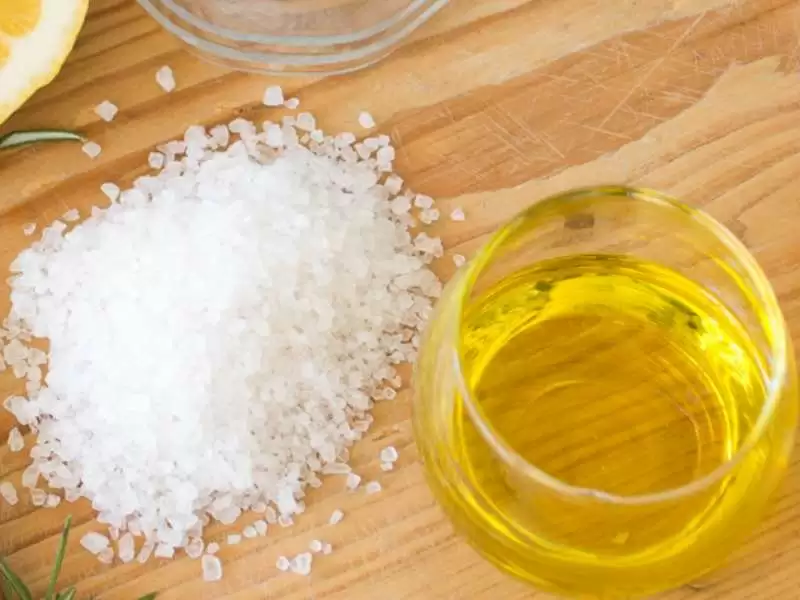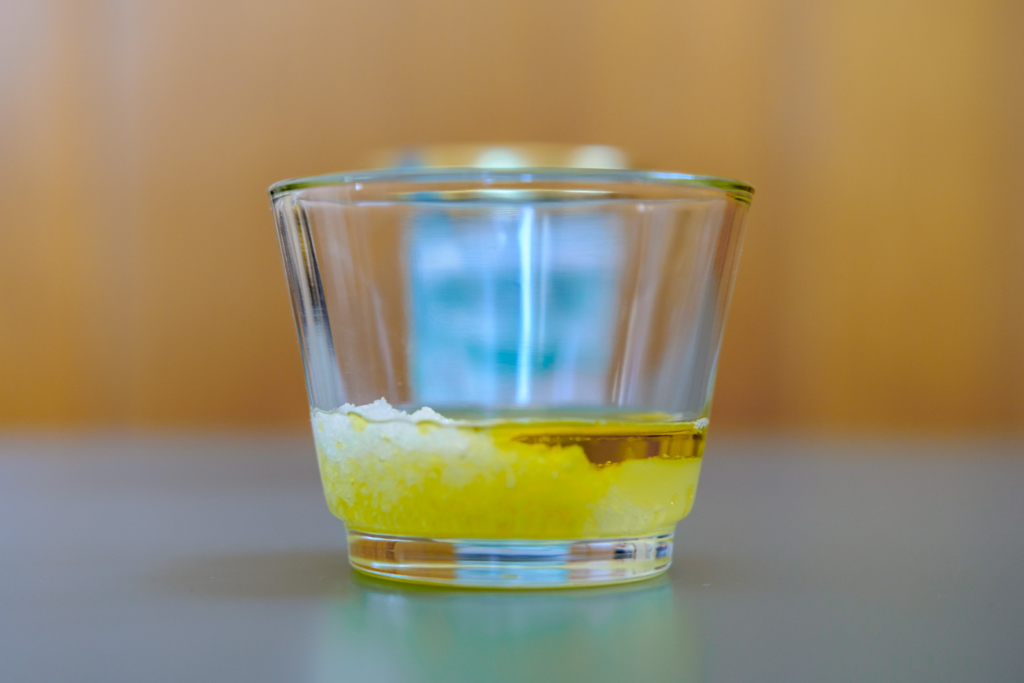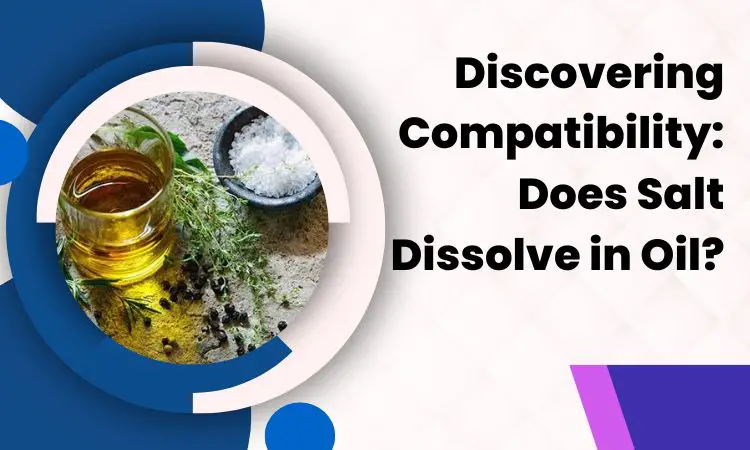No, salt doesn’t dissolve in oil because
- They aren’t chemically compatible.
- Salt is an ionic polar compound and oil is a non-polar solvent.
- Ionic polar compounds only dissolve in polar solvents. So, salt doesn’t dissolve in oil.
- When salt is added to oil, it sinks to the bottom.
To learn about whether salt dissolves in salt or not, follow the article.
Key Takeaways
- Salt doesn’t dissolve in oil as they are chemically incompatible.
- Salt will sink to the bottom when mixed with oil and form a blob. This is because the particles aren’t attracted to the oil molecules.
- There are some ways to mix salt and oil together, such as using emulsifiers or grinding into fine powder. However, these methods won’t completely dissolve in the oil.
Reasons Why Salt Does Not Dissolve in Oil?

Oil and salt cannot dissolve because they are incompatible. Salt is a polar element while oil is a non-polar element. So, they are not compatible to mix together.
In chemistry, a polar solute will dissolve in a polar solvent. For instance, salt can be considered a polar solute, while water can be considered a polar solvent. So, they form a bond, and salt dissolves in water.
But, oil is a non-polar substance. On the other hand, salt is a charged polar solute. So, they aren’t compatible to form a bond. And thus, salt doesn’t dissolve in oil.
What Happens If You Try to Dissolve Salt in Oil?
When you mix oil and salt together, the salt will sink to the bottom and form a blob. This is an interesting science experiment and is widely popular in science classes.

During cooking or frying, if you add salt to oil, it will degrade prematurely. Salt causes a chemical reaction that degrades oil to form polar compounds.
It is important to remember that oil is composed of fatty acids which oxidize when heated. But salt accelerates the oxidation of fatty acids. This breaks down the oil. As a result, foods turn out to have off smells and flavors.
This is the reason why it’s better not to season foods like steaks or catfish steak with salt before deep frying.
How to Dissolve Salt in Oil?
Even though it is naturally impossible to mix salt and oil, here are some ways you can try:
Using Emulsifiers:
You can mix salt and oil together using emulsifiers. Emulsifiers help to suspend the salt particles by reducing the surface tension between oil and salt. You can create a mixture of salt and oil that appears more homogenous with emulsifiers. You can use emulsifiers like:
- Lecithin
- Pectin
- Mustard
| Product | Feature |
| NOW Supplements Sunflower Lecithin | Naturally occurring phosphatidylcholine Vegetarian and soy-free |
| Hoosier Hill Farm Hoosier Hill Fruit Pectin | Organic Vegetarian |
| Happy Belly Yellow Mustard | An Amazon choice brand Kosher |
Emulsifying Salty Water And Oil:
A much simpler way is trying to emulsify salt water and oil together. Because using a salt solution would mean that it’s mostly oil that is a ‘water in oil’ emulsion. You can do that by using emulsifiers like Margarine and lecithin.
Learn why water and oil don’t mix together-
Grind The Salt into Fine Powder:
It’s possible to dissolve salt in oil by grinding the salt into fine powders and then mixing the powder with oil. Grinding the salt will increase its surface area and make it easier to dissolve in oil. You can grind using a mortar and pestle and then mix it with oil. However, the amount of salt has to be very limited.
You can’t mix oil and salt naturally because of their chemical incompatibility. So, you can never achieve complete dissolution of salt in the oil.
Does Salt Dissolve in Other Elements?
Although salt doesn’t dissolve in oil, it does in many other elements starting with the simplest one, water. Let’s see what other elements bond with salt.
Does Salt Dissolve In Water?
Yes, salt dissolves in water. Firstly both water and salt are polar compounds. Thus, they are compatible to form a bond with each other. So, salt dissolves in water.
Does Salt Dissolve In Honey?
Yes, salt dissolves in honey. According to the USDA, honey contains about 17-20% water by weight. As a result, salt is easier to dissolve in honey when mixed with water.
But as honey consists of other solutes like sugar, the rate of salt dissolution is not the same as water. So, the salt might not completely dissolve in honey.
Honey is used to prepare different dishes like garlic chicken and labouchere sauce. So, a pinch of salt mixed in with honey will only enhance the flavor of your meal.
Does Salt Dissolve In Butter?
Yes, salt will dissolve in butter. But it is more likely that the salt dissolves in with the water content of butter. As long as the butter contains more water, salt will dissolve more.
Normally, butter has about 20 g of water. You can dissolve about 5 g or 1 teaspoon of salt in 20 g butter.
Does Salt Dissolve In Vinegar?
Yes, salt dissolves in vinegar. The majority of the liquid in vinegar is water, which is responsible for dissolving salt. Salt and vinegar don’t react chemically, so there is no change in the pH value of the solution.
The salt will dissolve completely until it reaches a saturation point. As the temperature and concentration of vinegar vary, so does the saturation point of salt.
Frequently Asked Questions (FAQs):
Does Salt Dissolve In A Mixture Of Water And Oil?
In a water and oil combination, salt will dissolve in the water component, but not in the oil component. Water doesn’t mix in with the oil, so they form a heterogeneous bond. Floating above the water are the oil molecules in this bond.
Does Salt Dissolve In Kerosene?
No, salt doesn’t dissolve in kerosene because they are not compatible chemically. Salt is an ionic compound and kerosene is a non-polar solvent. As ionic compounds can only dissolve in polar solvents, salt cannot dissolve in kerosene because it is a polar solvent.
Does Rock Salt Dissolve In Oil?
No, rock salt doesn’t dissolve in oil. All salts are made up of ionic bonds of sodium and chlorine. So, they are charged compounds. On the other hand, oil molecules aren’t charged. As there is no charged reaction between oil and rock salt, it doesn’t dissolve in oil.
Closing Words
So, by now you got your answer whether salt dissolves in oil or not.
As both salt and oil are chemically incompatible, they can’t be mixed. You’ve also learned that there are some ways they can be mixed and used together. Salt and oil, on the other hand, will never be able to dissolve completely into one another.





